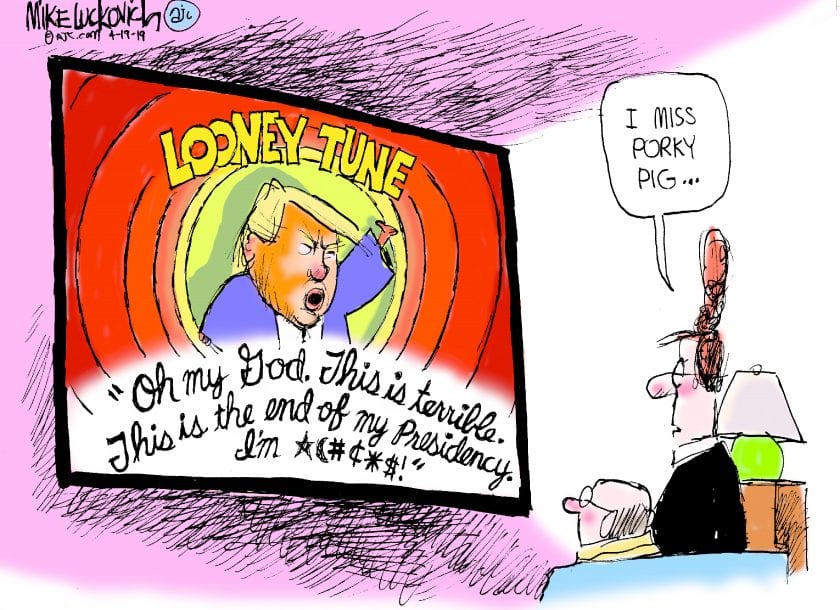BY JOE CONASON
 If Donald Trump were the president of any private or public entity – if he were the president of anything, that is, except the United States – he would be under indictment today for obstruction of justice, intimidating witnesses and conspiracy, at a minimum. That is what the Mueller report, even in redacted form, tells us in no uncertain language.
If Donald Trump were the president of any private or public entity – if he were the president of anything, that is, except the United States – he would be under indictment today for obstruction of justice, intimidating witnesses and conspiracy, at a minimum. That is what the Mueller report, even in redacted form, tells us in no uncertain language.
“No obstruction”? That’s merely another Trump lie, repeated by his public relations flack, Bill Barr, who operates under the guise of the U.S. attorney general.
The rules that govern the Justice Department prohibit criminal prosecution of a sitting U.S. president. Fortunately for him, but unfortunately for our country, that means Trump will escape the usual consequences of nearly a dozen instances of felonious behavior outlined by Mueller. Ordering around his subordinates like an old-time mob boss, the president repeatedly attempted to curtail Mueller’s investigation.
Anyone who has been paying attention saw several of these interventions unfold, starting with his attempt to prevent the prosecution of former national security adviser Mike Flynn, and his dismissal of the uncooperative FBI Director James Comey, and his public efforts to bully Attorney General Jeff Sessions [who showed surprising backbone by insisting on his own recusal from the Russia probe]. But Trump’s malfeasance went far beyond those more-or-less public incidents.
Based on extensive, credible and corroborated testimony from former White House counsel Don McGahn, Mueller reveals several attempts by Trump to have the special counsel fired and the investigation ended. McGahn recalled the president phoning him from Camp David on a June Saturday in 2017 and ordering him to call Deputy Attorney General Rod Rosenstein with instructions to fire Mueller. Instead, McGahn wisely told Reince Priebus, then chief of staff, that the president had told him to “do crazy s—.”
So insistent was Trump – barking, “Mueller has to go,” and “You gotta do this. You gotta call Rod” – that McGahn considered resigning. He didn’t want to be remembered in history as a pawn in a crooked president’s Saturday Night Massacre.
When everyone thought the president spent all his time watching Fox News, tweeting and eating burgers, he was often occupied with his incessant attempts to disrupt or end the Russia probe. As the report notes: “Our investigation found multiple acts by the president that were capable of exerting undue influence over law enforcement investigations, including the Russian-interference and obstruction investigations.”
“The incidents were often carried out through one-on-one meetings in which the president sought to use his official power outside of usual channels,” it continued. “These actions ranged from efforts to remove the Special Counsel and to reverse the effect of the attorney general’s recusal; to the attempted use of official power to limit the scope of the investigation; to direct and indirect contacts with witnesses with the potential to influence their testimony.”
Like McGahn, several others caught up in Trump’s obstruction efforts, including former campaign manager Corey Lewandowski, deflected his bullying – which probably saved them from indictment.
But the notion that the president’s failure to derail the probe somehow mitigates his obvious guilt is wrong. Obstruction doesn’t have to succeed to be worthy of indictment. It is just as wrong as the notion – articulated by the hackish Barr – that if there was no underlying crime of conspiracy with the Russians, there could be no obstruction charge. In fact, nearly every legal expert dismisses that theory as pure nonsense. Many people have gone to prison for obstruction without any underlying crime.
Were there underlying offenses of conspiracy with a hostile foreign power? The report’s first part enumerates many shameful instances between Russians and the Trump inner circle, which “expected” help from that foreign adversary. According to Mueller, however, no crime could be proved to a jury beyond a reasonable doubt.
But consider what we now know Trump himself said to Sessions when first told of the special counsel’s appointment. He knew what his son Don Jr. and his son-in-law, Jared Kushner, had done; he knew that he had lied about Trump Tower Moscow, and many other things. He knew what Paul Manafort – whom he succeeded in silencing with a promised pardon – had done.
“Oh my God. This is terrible,” he said, according to the report. “This is the end of my Presidency. I’m f—ed.”
He had the motive, the method and the many opportunities to obstruct justice, exactly as former President Richard Nixon did. The question that every honest member of Congress now faces is whether he has earned the same fate.
– Joe Conason’s columns appear regularly in The Oklahoma Observer
Creators.com








